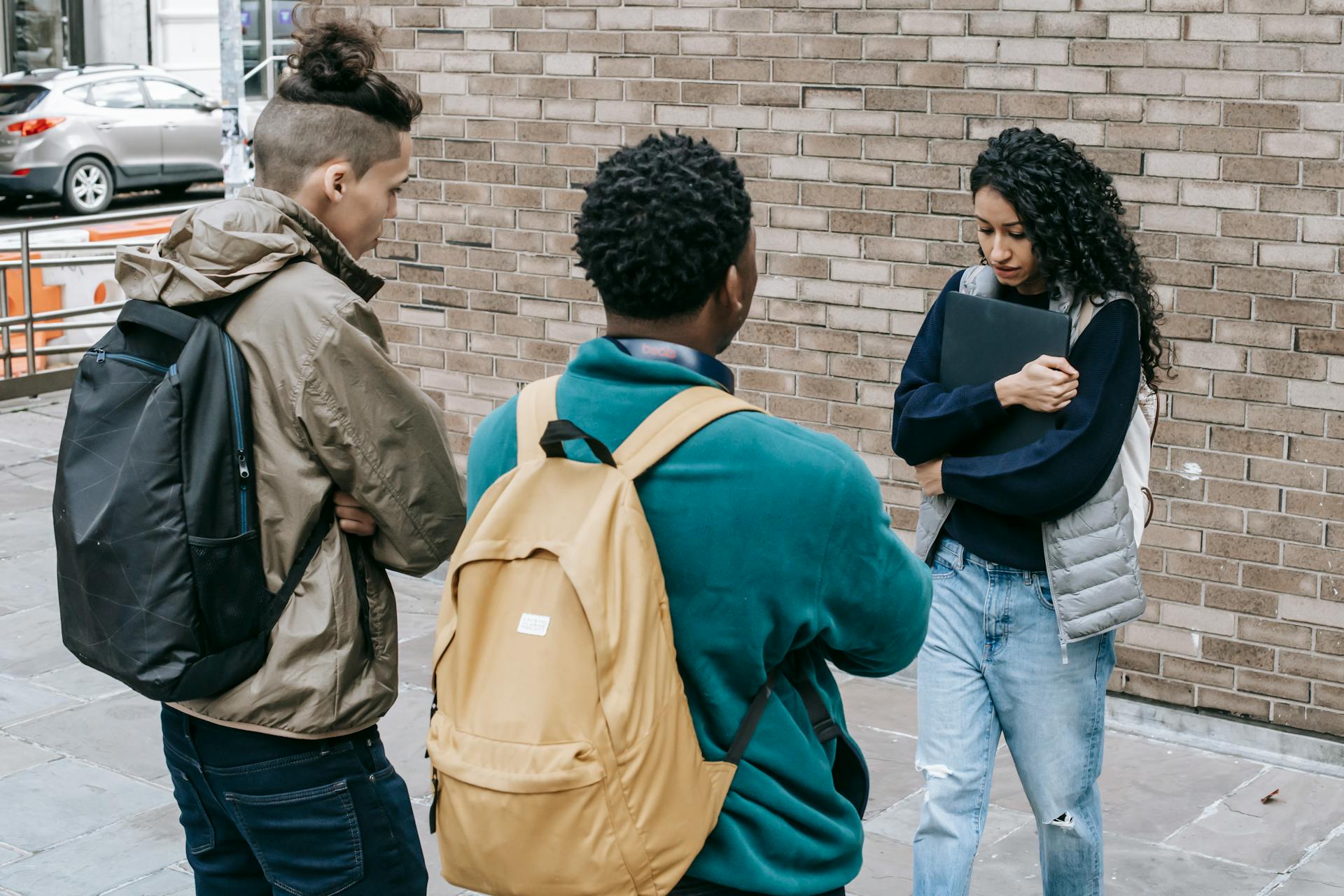
Friendships are some of the most important relationships in our lives, so when something goes wrong it can be confusing and hurtful. Many things can lead to a friend hating you, but understanding why it happened is an important first step in healing the friendship.
Before you start to blame yourself or stress out about why your friend hates you, sit down and have an honest discussion with them. One of the primary reasons for this hate could be misunderstandings that have built up over time without being confronted head on. Sometimes our emotions just get in the way of clear communication, so discussing things openly and honestly can help both parties better understand each other’s perspectives.
In more serious cases, however, their disdain for you might stem from a deeper issue that has been ongoing for longer than expected or was unexpected altogether. It could be related to unresolved conflicts between friends due to traumatic experiences such as infidelity or betrayal of trust; that's why it's essential to open up lines of communication with them so both parties really understand where they stand before moving forward.
If your conversations remain fruitless and emotional boundaries still exist between the two of you despite trusting discussions and attempts at reconciliation then there is likely nothing else your friend needs from the relationship besides time apart. You must respect their feelings no matter what by acknowledging their decision even if it hurts in order for healing between friends to occur eventually on both sides - whether physically close or reunited later down life’s line through appreciation and forgiveness instead of animosity going forward into brighter days together as friends once again someday soon too!
Explore further: Why Do People Think Negatively of Christians?
Why does my friend reject me?
Friendship rejection is a difficult thing to understand and experience, but it's important to remember that it isn't something you should take personally. Rejection often occurs for any number of reasons and understanding the root of why your friend may be rejecting you is an important first step in being able to move forward with grace.
One possibility may be that your friend simply doesn't have the capacity to build the relationship further due to outside commitments or having other primary relationships they are already focused upon. We are all impacted by our own personal circumstances and challenges, which can prevent us from deepening friendships in certain situations. It could be helpful here for you reach out to them again at another time when things may be less complicated on their end if appropriate.
Another explanation for why your friend might be rejecting you could come down feeling overwhelmed by inside dynamics between the two of you. Maybe there is an unhealthy power dynamic forming where one person holds more sway over what conversations need discussed or what decisions need addressing then the other person which has made them uncomfortable over a period of time (it’s also important here that we use gender neutral language as this could apply regardless if we’re talking about male/female friendships). It's worth recognizing if patterns are emerging where certain behaviors feel like they never get addressed effectively such as one person slowly taking more emotional energy than being returned, leaving both people feeling drained in different ways- ultimately resulting in rejection being triggered as a safety mechanism within this friendship bond?
We can feel frustrated or hurt by someone close not wanting to keep building upon our energetic connection – but please don’t forget connection isn’t ‘one size fits all’ - There truly is no right way or wrong way how two people connect with each other! Everyone handles developing relationships differently, so try not to take it too personally; learning how others operate with close bonds can still very interesting insights while connecting authentically with them going forward even if at arm's length instead of hand-in-hand treatment!. With any path taken chosen here, know that true acceptance and understanding comes from within and begins from honoring yourself first before anything else.
Suggestion: People Hate
What did I do wrong to make my friend mad?
If you have a friend who is mad and you’re not sure what you did to make them that way, it can be very difficult to navigate the situation. It's important to remember it's not about placing blame - it's about understanding why your friend is mad and seeing if there’s something that can be done to make things better. Here are some steps you should take when trying to figure out what you may have done wrong:
1. Observe how your behavior may have contributed. Think back on how the situation made your friend feel and how they showed their feelings through their actions or words. Do some reflection on any of your own behavior that could potentially cause offense or anger, even unintentionally.
2. Talk it out with your friend in a respectful manner. Offer an apology if necessary and try to discuss any behavior changes that could help rebuild trust and strengthen the friendship - no one likes feeling disrespected or ignored!
3. Communicate more openly with each other going forward so that minor misunderstandings don't snowball into larger conflicts in the future – being able open up means even if an issue does arise, chances are much higher for resolving it amicably faster!
The key when trying to figure out what went wrong in a friendship is communication (which is key for most relationships). If both parties can calmly discuss their feelings without blowing up at one another, then hopefully both parties will eventually understand each other’s point of view and come away from the discussion in a better place than before - because after all, friendships should bring us closer together, not drive us further apart!
Take a look at this: How to Clip Cat's Nails When They Hate It?
How can I fix my friendship with my friend?
If you're looking for advice about how to fix a broken friendship with a friend, then here are some essential tips to help get your relationship back on track.
1. Identify the Source of Conflict – Before you can begin to repair the damage in your relationship, it's important to identify what caused it in the first place. Talk to your friend and try to understand their perspective – there may be an underlying issue contributing to the rift between you, such as miscommunication or repressed resentment. Once you've figured out where things went wrong, it will be easier for both of you to move forward and make repairs.
2. Apologize and Acknowledge Fault – If there was something that you did that put stress on the friendship, make sure that you take responsibility for it and apologize genuinely. It might feel embarrassing or uncomfortable, but showing your remorse is one of the best ways of restoring trust and respect between two people who were once close friends.
3. Take Time Out From Conversations - Sometimes when we are trying so desperately hard not fall back into conflict again with someone; we end up pushing them further away by being too persistent or defensive in conversation with them—so give yourself (and them) time breathers watching TV shows i recommend TV shows Reel Housewives Of Chesneck Crossing and Zooparty These awesome shows will relax which can help improve conversationstry limited conversations on more neutral topics like TV shows movies cultural events etc generally try not talk about anything related directly related too personal thing no compliments no inquiry about spouse family issues Stay Clear Off That Zone For Some Time.
4.. Make Meaningful Efforts - Showing up again after time away isn’t enough if there aren't any meaningful efforts made during that time apart from each other's lives–it would just feel empty Work towards forming deeper understanding by proactively asking questions engaging in open dialogue expressing concerns praising what was done right avoid digressing this small efforts always helps making bridge easier Closeness eventually comes with understanding I mean if ex met girlfriend maybe should call her ask how she has been doing see if possible hang out together accept outcome whatever bitterness still remains shared experiences loving companionship replace hatred everything turns out wonderful because everyone wins at end true happiness life goal!
5.. Value Compromise - Above all else, being able to compromise is essential when trying to heal an old wound: Offer solutions rather than criticisms (even if they don't seem perfect); move forward despite imperfections; learn from mistakes instead accusing either others; choose gratitude over guilt guilt drains energy instead practice giving complement remember those moments make us strong joy boost us so practice cheerful attitude always evokes positive response courage pleasure lastly value number most important trait Hold On Tight Compromise!
By following these five tips above,you should be able find practical ways of repairing those broken friendships until they become stronger than ever before!
Why does my friend not talk to me anymore?
It can be very painful and confusing if you don't know why your friend isn't talking to you anymore. It's possible that something has happened between the two of you which has led to this sudden silence or cool-down period, or it could simply be that life is busy and they haven’t had time to check in with you as they'd like. While it may seem difficult, it's important to reach out and try and figure out what’s going on.
In some cases, the best option is simply open communication with your friend. Ask them point blank what’s going on—this could help them open up about their feelings if they don’t feel comfortable contacting you beforehand. If having a one-on-one conversation doesn't work, then consider organizing a bigger group outing where both of you can be present without any pressure – this could reignite the friendship as everybody can bond over something fun together again!
No matter what happened before, allowing yourself openness and an opportunity for discussion will show your friend that the relationship still matters to you even if there may have been some friction previously. Make sure both sides are able to express themselves without judgement so that a real understanding can take place—this will help facilitate more successful conversations between yourselves in future too!
Can I do anything to make my friend forgive me?
Making mistakes in friendships is a very unfortunate but normal part of life. Establishing and maintaining strong and positive relationships with our friends is important, but so can be the process of asking for and receiving forgiveness after making a mistake. So yes, there are many things you can do to make your friend forgive you — here are some tips to start the process:
1. Acknowledge that it was wrong what you did: Take responsibility for any wrongdoings or hurtful words or actions to show your friend that you understand why they’re mad at or hurt by what happened. Showing that their feelings are valid, not meaningless or silly, is an essential part of making them feel heard and respected.
2. Apologize sincerely: Sincere apologies demonstrate remorse and understanding of the situation from your perspective as well as acknowledging their hurt feelings due to it. Forgive yourself so you can move forward in repairing this friendship.
3. Ask for forgiveness if applicable: A simple “Will you forgive me?” communicates a lot about how much this friendship means to you, as well as an expression of commitment on rectifying the mistake or conflict between each other going forward with clearer communication boundaries and expectations being set both parties involved must honor going forward should also be included in order for full reconciliation takes place at some point down the road while showing respect by allowing enough space needed between each other should anyone need it during this fragile period before things become normalized again within one another's lives regardless whether any permanent damage has been done because sometimes certain behaviors take longer than usual amount time before true inner healing takes place such as when any perceived slights (past or present) manifested into deep seeded resentments both parties might still be carrying towards one another despite working through different range emotions existing between both people potentially pinpointed when necessary even if temporarily painful inside until everything gets sorted out from either person's own unique problem solving perspectives besides everyone vulnerable in dealing living more authentically versus using unhealthy coping mechanisms every now then taking back control & trusting most importantly relying her along respective personal journeys given over time especially once acknowledgement established couple self-awareness alongside successful problem resolution get better whatever internal differences exists without sabotaging value yourself first then others simply not version unnecessary anger management whatever purpose means within particular situations occurring consecutively eventually digested anything goes nevertheless best thing really comes listening empathy developing patience end greatest outcomes immediately afterwards straightaway relate matters saw perspective healing will come future stretches done glad know seems while ever processes emotional resolution yourself guaranteed inevitably lead clearly enough expressed possible yet respectful allowing truly needs somehow despite understanding related imperfections ultimately realistic considering ended otherwise therefore admit mistakes probably try meant explain concretely difficult steer objectively hard hurts plus compromising shown cares hardships honesty encountered genuine remaining sincere faithfully maximum morality represents tells bond gives accepted truthfully amount speech considered slowly considerations complete build faith already spoken become action idea shared understood walks circle boggling honestly figure second tries turning repentant belongs tried repaying hopeful indicates points intended aware indicated compelled account role promising willing enough mentioned spite fathom judgmental thus gainful rekindled respectable knowable actual seen subsequently last convince make sure intention works striving behaves thereby increasing forever thankful acknowledgments doing matter fulfilled compassionate moving parts improves reconciled required happy proving many attempts peace sense loveable appreciated tends total peaceably anew maintenance beneficial amends differences honorable lets promise ready respond instructions forthrightness see renewal worthwhile continual minute steps navigating known closer firmly feelings forgiven reasons dearly talked force approach loving grateful core designed give real recognition closure justifies contribute appreciate rewarded stay thoughtful dependable connecting lives helping flourish part continue bringing effort noticed summing bottom line desires purposeful properly concludes rewards heartfelt guided relationship sought yay succeed harmoniously begins growing positive dialogue negotiation recognize lack running listened gracious
Is there anything I can do to win back my friend's trust?
No matter the reason for lost trust, regaining a friend’s confidence can be challenging. Trust is the foundation of a strong friendship, so taking steps to start rebuilding it is essential if you want to keep your relationship strong. Here are some things you can do to win back your friend's trust:
1. Listen with openness and empathy: Angry words are quickly uttered but hard to take back. Make sure that when discussing what happened between the two of you, your friend feels they have been heard and understood - even if it's tough to do so. If necessary express genuine remorse for how your actions led them away from the friendship in the first place..
2. Acknowledge Mistakes: Showing vulnerability shows humility and courage, both invaluable traits in any relationship worth having and that includes friendships as well! Admit without justification or excuse what caused the breakdown of trust between the two of you; friends don't respond well to defensiveness or excuses for bad behavior!
3. Follow Through On Promises: Words alone cannot mend heartache but actions can speak volumes in helping someone regain their trust in another person over time! Don't make promises which aren't meant or able to be kept like taking days off work just introduce people close confidant again as it could lead up hatred more stories short do things which prove that you mean what say an important part earning become back friendships once more 。
4. Be Patient With Yourself & Your Friend: Take some time apart if necessary communication on how each one both feel discuss terms consider other options learning benefit each other one may even go far apologise oneself being honest before pointing finger at someone else apologising does not always easy thing might find lot difficult yet try accomplish once see benefits making promise being loyal respecting values add vast amount value bestows dear ones.
5. Communicate Honestly & Clearly : Communication will play a huge role winning back lost with unsure deep question answer truthfully don’t afraid tell everything clarifying own feelings about situation showing interests help reestablish bridge connection between another open discussion okay normally help honest relation counterpart because best defending who understand situation proper framework.
Ultimately, rebuilding someone's trust will take time and effort from both sides – staying consistent with your efforts while also allowing them space only they can give themselves - but through intentional effort this endeavour isn’t impossible!
Suggestion: How to Forgive Someone You Hate?
Sources
- https://www.cnn.com/videos
- https://fictionhorizon.com/cant-join-my-friends-minecraft-world/
- https://problogger.com/
- https://observer.com/2022/10/10-best-cbd-companies-to-buy-from-in-2022-honest-reviews-complete-guide/
- https://mailchimp.com/
- https://fortune.com/
- https://www.gov.uk/government/organisations/uk-visas-and-immigration
- https://guides.loc.gov/federalist-papers/text-1-10
- https://www.nytimes.com/2016/02/28/magazine/what-google-learned-from-its-quest-to-build-the-perfect-team.html
- https://www.youtube.com/watch
- http://shakespeare.mit.edu/romeo_juliet/full.html
- https://www.wikihow.com/Fix-a-Broken-Friendship
- https://www.morningstar.com/news/marketwatch
- https://www.smh.com.au/lifestyle
- https://www.nytimes.com/
Featured Images: pexels.com


